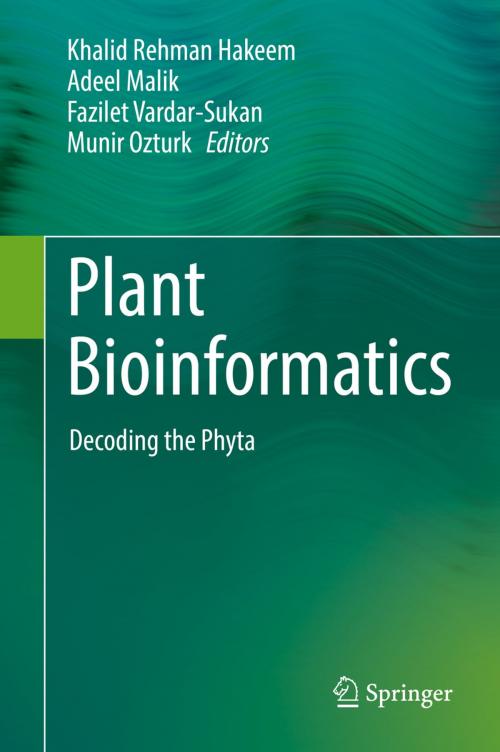Plant Bioinformatics
Decoding the Phyta
Nonfiction, Science & Nature, Science, Biological Sciences, Physiology, Botany| Author: | ISBN: | 9783319671567 | |
| Publisher: | Springer International Publishing | Publication: | November 21, 2017 |
| Imprint: | Springer | Language: | English |
| Author: | |
| ISBN: | 9783319671567 |
| Publisher: | Springer International Publishing |
| Publication: | November 21, 2017 |
| Imprint: | Springer |
| Language: | English |
This book: (i) introduces fundamental and applied bioinformatics research in the field of plant life sciences; (ii) enlightens the potential users towards the recent advances in the development and application of novel computational methods available for the analysis and integration of plant -omics data; (iii) highlights relevant databases, softwares, tools and web resources developed till date to make ease of access for researchers working to decipher plant responses towards stresses; and (iv) presents a critical cross-talks on the available high-throughput data in plant research. Therefore, in addition to being a reference for the professional researchers, it is also of great interest to students and their professors.
Considering immense significance of plants for all lives on Earth, the major focus of research in plant biology has been to: (a) select plants that best fit the purposes of human, (b) develop crop plants superior in quality, quantity and farming practices when compared to natural (wild) plants, and (c) explore strategies to help plants to adapt biotic and abiotic/environmental stress factors. Accordingly the development of novel techniques and their applications have increased significantly in recent years. In particular, large amount of biological data have emerged from multi-omics approaches aimed at addressing numerous aspects of the plant systems under biotic or abiotic stresses. However, even though the field is evolving at a rapid pace, information on the cross-talks and/or critical digestion of research outcomes in the context of plant bioinformatics is scarce. “Plant Bioinformatics: Decoding the Phyta” is aimed to bridge this gap.
This book: (i) introduces fundamental and applied bioinformatics research in the field of plant life sciences; (ii) enlightens the potential users towards the recent advances in the development and application of novel computational methods available for the analysis and integration of plant -omics data; (iii) highlights relevant databases, softwares, tools and web resources developed till date to make ease of access for researchers working to decipher plant responses towards stresses; and (iv) presents a critical cross-talks on the available high-throughput data in plant research. Therefore, in addition to being a reference for the professional researchers, it is also of great interest to students and their professors.
Considering immense significance of plants for all lives on Earth, the major focus of research in plant biology has been to: (a) select plants that best fit the purposes of human, (b) develop crop plants superior in quality, quantity and farming practices when compared to natural (wild) plants, and (c) explore strategies to help plants to adapt biotic and abiotic/environmental stress factors. Accordingly the development of novel techniques and their applications have increased significantly in recent years. In particular, large amount of biological data have emerged from multi-omics approaches aimed at addressing numerous aspects of the plant systems under biotic or abiotic stresses. However, even though the field is evolving at a rapid pace, information on the cross-talks and/or critical digestion of research outcomes in the context of plant bioinformatics is scarce. “Plant Bioinformatics: Decoding the Phyta” is aimed to bridge this gap.















